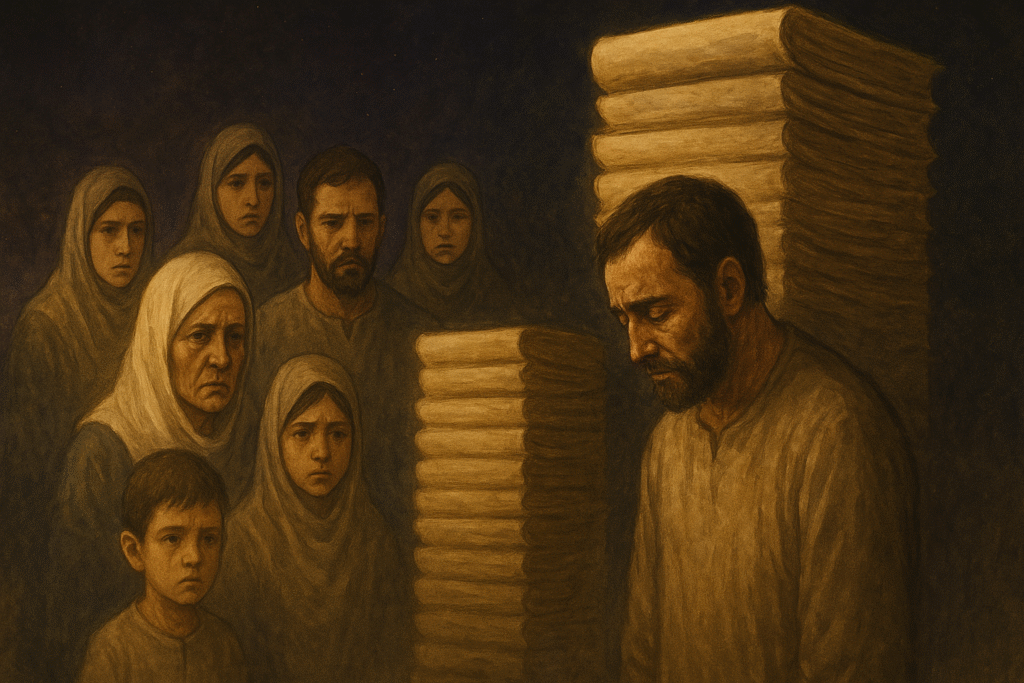“And fear a Day when no soul will suffice for another… nor will intercession be accepted.”
— Surah Al-Baqarah 2:48
The Day We All Stand Alone
We imagine Judgment Day as something cosmic and distant. Fire, light, scales, scrolls, angels. But what we often forget… is the silence.
The silence when your mother won’t look at you.
The stillness as your child, once cradled in your arms, turns away.
The ache in your chest when your spouse, who shared your secrets, doesn’t step forward.
Because on that Day, every soul will be consumed by one question:
“How can I save myself?”
A Real Story: The Blame That Came Too Late
Aisha was always the eldest. The dependable one. The one who carried groceries, raised siblings, missed her school trips so her younger brother could go instead.
Now in her late 40s, she told me something that’s haunted me since:
“When I got divorced, no one in my family stood up for me. Not even my father. He said, ‘Be patient. Don’t bring shame.’ That broke me more than the marriage ever did. But I kept quiet. After all, he’s my father.”
She paused, then added softly, “But if I see him on the Day of Judgment, and Allah allows me to speak… I don’t know if I’ll stay quiet then.”
When Love Isn’t Enough to Carry the Weight
Many of us think our love—our family ties—will shield us on that Day. But the Qur’an gives a sobering reminder:
“That Day, a man will flee from his brother, and his mother and his father, and his wife and his children. For every man, that Day, will be a matter adequate for him.”
(Surah Abasa 80:34–37)
Imagine your sister standing before Allah and saying:
“She always used to backbite me to our cousins. Even when I stayed silent.”
“He watched me struggle financially, and still never offered help.”
“She blamed me for everything in the marriage—and never once said sorry.”
And now… you owe them. Not in money. Not in words.
In good deeds.
A Currency of Regret
On that Day, we pay not with coins or crypto, but with prayer units. With fasting. With Qur’an recitations. With smiles we gave sincerely.
And suddenly, the mountain of good deeds we proudly carried… gets chipped away by those we wronged.
“Do you know who the bankrupt one is?” the Prophet ﷺ asked.
“It is the one who comes with prayer, fasting, and charity—but has insulted this one, slandered that one, consumed another’s wealth, shed blood, and beat others.
So [their] good deeds will be given to those [they wronged].”
— Sahih Muslim
The Urgency to Make It Right—Now
We still have time. Here are a few quiet ways to begin:
- Reflect: Who in your family has suffered because of your words or silence?
- Apologize: Even if years have passed, your humility could heal what time could not.
- Make restitution: If you owe support, money, or emotional honesty—give it.
- Pray for them: Du‘ā’ is the softest form of amends—but no less powerful.
- Seek Allah’s forgiveness: Not just for sins, but for the rights you neglected.
A Closing Dua
“O Allah, do not let me stand before You carrying the pain of those I love. Let me be someone whose deeds weigh in their favour, not against them.”
Final Thought
Sometimes the deepest injustice isn’t to strangers—it’s to the ones who loved us most.
On that Day, our titles won’t matter. Not “mother,” “husband,” or “daughter.”
Only truth. Only justice. Only what remains of our good deeds after everyone we’ve wronged has had their say.
I will end the post with a scenario!
Scenario: The Man with Many Deeds—But Many Debts in the Hereafter
The scrolls of his good deeds shine like gold. Decades of prayer in the mosque. Countless Qur’an recitations. Thousands donated to charity. People in the crowd whisper, “He must be safe.”
The day of judgement came.
But then, a voice calls out.
“I am his wife. He never raised his hand against me, true—but his silence hurt more. He saw me worn out, anxious, burdened with the children, and never once helped. I cried myself to sleep while he was busy with his life. I ask for justice.”
A portion of his good deeds float toward her.
Then another voice.
“I am his daughter. He told others to raise their daughters with love, but he was hardly there for me. My self-worth bled quietly through the years. I ask for justice.”
Another scroll disappears to her.
A third voice trembles.
“I am his mother. When I grew old and confused, he left me in a home, promising it was ‘for the best.’ I longed for his visits. I forgave him in life, but here, where truth reigns, I cannot ignore what my heart bore. I ask for justice.”
More deeds vanish piling on his mother.
A group steps forward—his siblings.
“He was the eldest. He held the inheritance. He never divided it as he should. We asked, he delayed. We needed, he ignored. He smiled in public while we sat with private grief. We ask for justice.”
His shoulders begin to slump.
Scroll after scroll leaves his side.
The once-mountain of gold becomes a heap of dust.
Final Words
In life, he was admired.
But in the Hereafter, the ones who loved him most stood not beside him—but before him, asking for what they were denied.
Not out of revenge.
But because justice, on that Day, is no longer how much good deeds you have, but how much you owe other!

